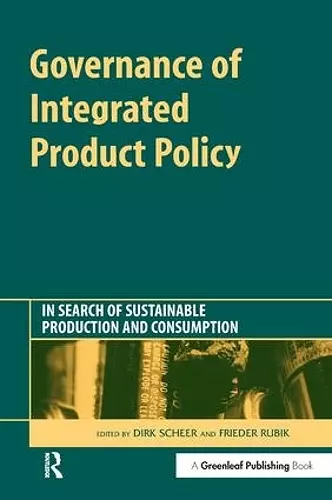Governance of Integrated Product Policy
In Search of Sustainable Production and Consumption
Dirk Scheer editor Frieder Rubik editor
Format:Hardback
Publisher:Taylor & Francis Ltd
Published:1st Feb '06
Currently unavailable, and unfortunately no date known when it will be back

This book presents a plethora of perspectives from policy-makers, researchers and consultancies, representatives from business, environmental and consumer associations on how to effectively conceptualise, institutionalise and implement integrated product policy (IPP).
Focuses on integrated product policy (IPP), which aims to improve the environmental performance of products and services through their life cycle. This book presents perspectives from policy-makers, researchers, consultancies, business, environmental and consumer associations, on how to conceptualize, institutionalize and implement IPP.
European policy patterns are in a state of transformation. New governance models are shifting power away from states and toward the involvement of all stakeholders and the idea of shared responsibility. It's a move from command and control to push and pull.
What's in this new approach for the environment? This book provides a detailed analysis of the example of integrated product policy (IPP) which aims to improve the environmental performance of products and services through their life-cycle. All products cause environmental degradation in some way, whether from their manufacturing, use or disposal. The life-cycle of a product is often long and complicated. It covers all the areas from the extraction of natural resources, through their design, manufacture, assembly, marketing, distribution, sale and use to their eventual disposal as waste. At the same time it also involves many different actors such as designers, manufacturers, marketers, retailers and consumers. IPP attempts to systematically stimulate each phase of this complicated chain to improve its environmental performance. With the involvement of so many different products and actors there cannot be one simple policy measure for everything. Instead, IPP employs a whole variety of tools – both voluntary and mandatory – which are used to achieve identified objectives. These include economic instruments, the phase-out of dangerous materials, voluntary agreements, eco-labelling and product design guidelines.
IPP is still in relative infancy and can be seen as an ongoing process hugely dependent on effective governance measures to ensure its continued success. This book presents a plethora of perspectives from policy-makers, researchers and consultancies, representatives from business, environmental and consumer associations on how to effectively conceptualise, institutionalise and implement IPP.
The book is divided into four parts. First, the approach to the governance of IPP is examined in relation to other approaches to sustainable production and consumption. Second, the widely differing approaches to environmental product policy in practice at national, supranational and global level are analysed. Third, the book explores the challenge of designing a coherent policy mix to support the...
This book is a welcome contribution to the discussion on Integrated Product Policy (IPP) and to its understanding. It is the first volume dealing with the topic, despite IPP being on the EU-level agenda for almost a decade ... the book offers a good balance of topics, but also of voices. The different chapters are written by academics, EU and national public officials, consultants and industry stakeholders, offering a variety of insights. Moreover, the references to the wider international context, by the inclusion of contributions on the Swiss experience and on the United States and Canada, help to frame European IPP processes in a sound manner ... It should be a compulsory reading not only for students of environmental policy and multi-level governance, but also for policy makers and stakeholders. Its main strengths lie in the clear setting of IPP within the governance approach, with all the benefits and possible problems this might entail, and in the compelling illustration of the great variety of tools and policy strategies that could be used for implementation purposes. Let us only hope that the political momentum will not be lost and that IPP will become a successful policy, not confined to being an interesting research topic only. -- Irina Tanasescu, Vrije Universiteit Brussel (VUB) * Journal of Cleaner Production 16 (2008) *
ISBN: 9781874719328
Dimensions: unknown
Weight: 770g
377 pages